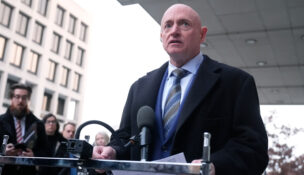Court of Appeals to decide murder case with deadlocked jury
Jayvyn Brantley, Guest Contributor//October 21, 2025//
Court of Appeals to decide murder case with deadlocked jury
Jayvyn Brantley, Guest Contributor//October 21, 2025//
Key Points:
-
Court of Appeals hears appeal in Luis Medina case
-
Medina charged with child abuse and first-degree murder
- If the panel sides with Medina, he will be a free man.
In pushing to dismiss his case, the legal defense of alleged murderer Luis Medina is arguing that a retrial would be a violation of his client’s constitutional rights. Medina’s fate now hangs on new deliberations by the Court of Appeals over whether his initial trial was justifiably dismissed after the jury reached a deadlock.
The case against Medina started in Feb. 2020, when he was arrested and charged with child abuse and first-degree murder of 1-year-old Sophie Bojorquez. The Department of Child Safety never received any prior reports involving Sophie Bojorquez or Luis Medina.
Medina’s trial started in Jan. 2025, despite being in custody since Feb. 2020. It lasted 15 days.
The jury for this case had a big problem; they were unset on a verdict. The jury was seven to five in favor of not guilty on both counts of child abuse and first-degree murder, according to court documents.
The failure of the jury to come to a conclusion created a deadlock, which prompted the judge to declare a mistrial at the State’s request. His retrial was then set for Sept. 2025.
Soon after, Medina’s legal team took action by claiming the retrial was without sufficient justification and violated Medina’s Fifth Amendment rights. The judge denied the motion on June 23, 2025.
Now, Medina wants a higher-court to step in before the retrial. Medina claims there were no indications of “manifest necessity.” Manifest necessity is a doctrine that allows a Judge to declare a mistrial due to extraordinary circumstances. He also claims the jury was not-fully deadlocked and could have still reached a verdict if given more time.
Medina’s legal team represented him on Oct. 8, 2025 at the Court of Appeals.
Defense Attorney John Gattermeyer argued that a retrial would violate Medina’s constitutional rights, specifically double jeopardy.. The double jeopardy clause protects defendants from being tried twice for the same crime.
Gattermeyer claimed the court failed to find manifest necessity and did not follow Arizona’s procedures for determining a true deadlock.
“There was no manifest necessity here. The court made no inquiry, no effort to see if the jury could continue. That is not what the law requires,” Gattermeyer said.
Gattermeyer compared Medina v. State trial closely to Gusler v. Wilkinson, a case that resembled closely with an improperly declared mistrial.
“This is the same mistake, the court did not question the jurors or give the impasse instruction. It simply stopped the trial at the State’s request,” Gattermeyer said.
Jordan Smith, a prosecutor representing the Maricopa County Attorney’s Office, argued the trial judge acted properly in calling for a retrial, and the jury made it clear that they could not agree.
“The note said they were at a standstill. After three days of deliberation following 15 days of trial, that is a clear deadlock,” Smith said.
Smith argued that forcing the jurors into making a decision could pressure them into making a coerced decision, and not being completely fair to the ethics of the trial.
“The judge was right to end it when she did, that was a reasonable call,” Smith said.
The panel questioned both sides about how a judge should go about before declaring a mistrial.
Judge Morse asked if the trial judge’s experience with observing the full trial should factor into the decision. “The trial judge sat through the entire proceeding, shouldn’t that context matter?” Morse said.
The court took the case under advisement and did not release an immediate ruling. If the panel sides with Medina, he will be a free man. If the panel sides with the prosecution, he will be facing a retrial.
Correction: This story has been updated to show that the case is under consideration of the Arizona Court of Appeals.














































